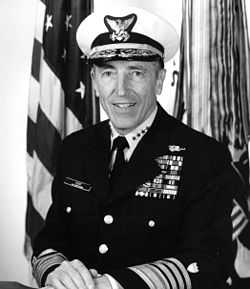Paul A. Yost, Jr.
| Paul A. Yost, Jr. | |
|---|---|
 | |
| Born |
September 27, 1929 St. Petersburg, Florida |
| Allegiance |
|
| Service/branch |
|
| Rank |
|
| Commands held | Commandant of the Coast Guard |
| Battles/wars |
|
| Other work | President, James Madison Memorial Fellowship Foundation |
Paul Alexander Yost, Jr. is a retired United States Coast Guard admiral who served as the 18th Commandant of the United States Coast Guard from 1986 to 1990.[1]
Early life and career
He is a native of St. Petersburg, Florida. He graduated from the United States Coast Guard Academy in New London, Connecticut, and earned graduate degrees from the University of Connecticut and The George Washington University. Prior to becoming Commandant, he served as a patrol boat commander during the Vietnam War. He later served concurrently as Commander of the Atlantic Area Maritime Defense Zone and as Commander of the New York City-based 3rd Coast Guard District, accepting those appointments in 1984. Prior to assuming those command posts, he served as Coast Guard Chief of Staff.
Tenure as Commandant
Yost was responsible for eliminating the longstanding tradition of beards at sea. He is also known for driving the Coast Guard toward a robust coastal defense mission, and a parallel initiative to dramatically increase the armament aboard Coast Guard cutters. Prior to his tenure Coast Guard cutters were outfitted with weapons systems designed to fight the War on Drugs, and other law enforcement related missions. He added naval warfare systems to larger cutters, which included the Harpoon missile system, close-in weapon systems (CIWS), and other similar upgrades. Following his retirement, the systems were removed and the coastal defense mission was de-emphasised in favor of the more traditional missions of search and rescue, law enforcement, marine safety and aids to navigation.
Yost's focus on the coastal defense mission was often derided by Coast Guard members and Congress alike who referred to his era as the "Yost-Guard." Ironically in the post–September 11, 2001 world, coastal defense, now called Homeland security, is arguably the most recognizable mission of the service.
Retirement
Since retiring from the Coast Guard, he has served as President of the Washington, D.C.-based James Madison Memorial Fellowship Foundation. He is a member of The Church of Jesus Christ of Latter-day Saints,[2][3] and has served on the church's Military Relations Committee.
On his retirement, he received the Naval Order of the United States's Distinguished Sea Service Award.
References
- ↑ United States Coast Guard Biography
- ↑ Famous Mormons in the Military
- ↑ Heidi A. Waldrop, "Paul Yost: The Admiral's Anchor Is the Gospel", Ensign, August 1987.
External links
| Military offices | ||
|---|---|---|
| Preceded by James S. Gracey |
Commandant of the Coast Guard 1986—1990 |
Succeeded by J. William Kime |